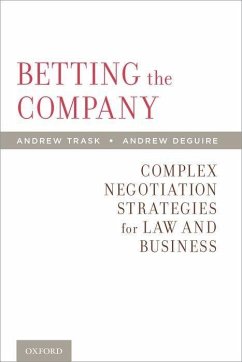- Broschiertes Buch
- Merkliste
- Auf die Merkliste
- Bewerten Bewerten
- Teilen
- Produkt teilen
- Produkterinnerung
- Produkterinnerung
Betting the Company: Complex Negotiation Strategies for Law and Business provides a thorough introduction to the concepts and tools required by lawyers and business people to successfully conduct a multi-faceted negotiation.
Andere Kunden interessierten sich auch für
![Law, Technology and Dispute Resolution Law, Technology and Dispute Resolution]() Riikka KouluLaw, Technology and Dispute Resolution61,99 €
Riikka KouluLaw, Technology and Dispute Resolution61,99 €![Company Law Company Law]() Brenda HanniganCompany Law60,99 €
Brenda HanniganCompany Law60,99 €![Dilapidations and Service Charge Dilapidations and Service Charge]() Denis J GarrityDilapidations and Service Charge77,99 €
Denis J GarrityDilapidations and Service Charge77,99 €![Patent Trolls Patent Trolls]() William J WatkinsPatent Trolls20,99 €
William J WatkinsPatent Trolls20,99 €![The Genius of American Corporate Law The Genius of American Corporate Law]() Roberta RomanoThe Genius of American Corporate Law10,99 €
Roberta RomanoThe Genius of American Corporate Law10,99 €![The European Company 2 Volume Hardback Set The European Company 2 Volume Hardback Set]() The European Company 2 Volume Hardback Set337,99 €
The European Company 2 Volume Hardback Set337,99 €![Law & the Beautiful Soul Law & the Beautiful Soul]() Alan NorrieLaw & the Beautiful Soul80,99 €
Alan NorrieLaw & the Beautiful Soul80,99 €-
-
-
Betting the Company: Complex Negotiation Strategies for Law and Business provides a thorough introduction to the concepts and tools required by lawyers and business people to successfully conduct a multi-faceted negotiation.
Hinweis: Dieser Artikel kann nur an eine deutsche Lieferadresse ausgeliefert werden.
Hinweis: Dieser Artikel kann nur an eine deutsche Lieferadresse ausgeliefert werden.
Produktdetails
- Produktdetails
- Verlag: Oxford University Press
- Seitenzahl: 368
- Erscheinungstermin: 3. Juni 2013
- Englisch
- Abmessung: 208mm x 139mm x 22mm
- Gewicht: 435g
- ISBN-13: 9780199846252
- ISBN-10: 0199846251
- Artikelnr.: 36815014
- Herstellerkennzeichnung
- Libri GmbH
- Europaallee 1
- 36244 Bad Hersfeld
- gpsr@libri.de
- Verlag: Oxford University Press
- Seitenzahl: 368
- Erscheinungstermin: 3. Juni 2013
- Englisch
- Abmessung: 208mm x 139mm x 22mm
- Gewicht: 435g
- ISBN-13: 9780199846252
- ISBN-10: 0199846251
- Artikelnr.: 36815014
- Herstellerkennzeichnung
- Libri GmbH
- Europaallee 1
- 36244 Bad Hersfeld
- gpsr@libri.de
Andrew Trask is counsel at McGuire Woods, LLP where he specializes in class-action litigation, including consulting on various complex litigation settlements. He frequently writes and speaks on litigation strategy and maintains the Class Action Countermeasures blog. He is co-author, with Brian Anderson, of The Class Action Playbook, Second Edition (Oxford University Press 2012). Andrew DeGuire is Vice President of Business Development and Global Growth for Johnson Controls, Inc. He has been involved in acquisitions and divestitures for more than 17 years. He has been a part of and led teams responsible for over $4 billion in value. He has been engaged in more than 40 deals that have closed successfully, and-just as important-more than 200 that have not.
* Acknowledgments
* CHAPTER 1: ELEMENTS OF COMPLEX NEGOTIATION
* 1.1 When good deals go bad
* 1.2 The nature of negotiation
* 1.3 The problem of complex negotiations
* CHAPTER 2: NON-RATIONAL JUDGMENTS
* 2.1 Heuristics - When our mental shortcuts get us into trouble
* 2.2 Professional biases - How training colors our world
* 2.3 Personality and emotion - Nobody's Spock
* CHAPTER 3: MULTI-PARTY NEGOTIATIONS
* 3.1 Multi-lateral negotiations - More people, more problems
* 3.2 Team negotiations - None of us is as dumb as all of us. I love my
team/I hate my team
* 3.3 Negotiations with organizational constituents - Behind the table
* 3.4 Practical suggestions
* CHAPTER 4 - MULTIPLE DECISIONS
* 4.1 Multiple options
* 4.2 Multiple issues
* 4.3 Agendas - The Secret Weapon
* 4.4 Practical applications
* CHAPTER 5 - TRANSACTIONS OVER TIME
* 5.1 Path dependence - Starting points matter
* 5.2 Time asymmetries - Why someone prefers to go slow
* 5.3 Exogenous shocks - What happens when stuff happens
* 5.4 Learning - Why some conflict may not be so bad
* 5.5 Sequential strategy - Why it pays to be nice
* 5.6 Practical implications
* CHAPTER 6 - REGULATED NEGOTIATIONS
* 6.1 Information and disclosure - basic concepts
* 6.2 Obligations/duties to constituents (corporate law)
* 6.3 Conduct of negotiations
* 6.4 What written agreement looks like (contract law/rules of
evidence)
* 6.5 Content of deal (tax/specific regulations)
* 6.6 Practical implications
* CHAPTER 7 - INTER-CULTURAL NEGOTIATIONS
* 7.1 Organizational culture - The Personality of the Organization
* 7.2 National culture - You can take the boy out of Iowa ...
* CHAPTER 8 - GRAND STRATEGY
* 8.1 Primary purpose
* 8.2 Scorecard
* 8.3 Internal capacity assessment
* 8.4 Best alternatives
* 8.5 Materiality/leverage
* CHAPTER 9 - INTELLIGENCE
* 9.1 What to Look For
* 9.2 How to Find It.
* CHAPTER 10 - TACTICAL MOVES
* 10.1 Deploying resources
* 10.2 Process - The importance of project management
* 10.3 Putting things in motion
* 10.4 Approaching the Other Side
* 10.5 In the Room
* 10.6 Put into action
* Index
* CHAPTER 1: ELEMENTS OF COMPLEX NEGOTIATION
* 1.1 When good deals go bad
* 1.2 The nature of negotiation
* 1.3 The problem of complex negotiations
* CHAPTER 2: NON-RATIONAL JUDGMENTS
* 2.1 Heuristics - When our mental shortcuts get us into trouble
* 2.2 Professional biases - How training colors our world
* 2.3 Personality and emotion - Nobody's Spock
* CHAPTER 3: MULTI-PARTY NEGOTIATIONS
* 3.1 Multi-lateral negotiations - More people, more problems
* 3.2 Team negotiations - None of us is as dumb as all of us. I love my
team/I hate my team
* 3.3 Negotiations with organizational constituents - Behind the table
* 3.4 Practical suggestions
* CHAPTER 4 - MULTIPLE DECISIONS
* 4.1 Multiple options
* 4.2 Multiple issues
* 4.3 Agendas - The Secret Weapon
* 4.4 Practical applications
* CHAPTER 5 - TRANSACTIONS OVER TIME
* 5.1 Path dependence - Starting points matter
* 5.2 Time asymmetries - Why someone prefers to go slow
* 5.3 Exogenous shocks - What happens when stuff happens
* 5.4 Learning - Why some conflict may not be so bad
* 5.5 Sequential strategy - Why it pays to be nice
* 5.6 Practical implications
* CHAPTER 6 - REGULATED NEGOTIATIONS
* 6.1 Information and disclosure - basic concepts
* 6.2 Obligations/duties to constituents (corporate law)
* 6.3 Conduct of negotiations
* 6.4 What written agreement looks like (contract law/rules of
evidence)
* 6.5 Content of deal (tax/specific regulations)
* 6.6 Practical implications
* CHAPTER 7 - INTER-CULTURAL NEGOTIATIONS
* 7.1 Organizational culture - The Personality of the Organization
* 7.2 National culture - You can take the boy out of Iowa ...
* CHAPTER 8 - GRAND STRATEGY
* 8.1 Primary purpose
* 8.2 Scorecard
* 8.3 Internal capacity assessment
* 8.4 Best alternatives
* 8.5 Materiality/leverage
* CHAPTER 9 - INTELLIGENCE
* 9.1 What to Look For
* 9.2 How to Find It.
* CHAPTER 10 - TACTICAL MOVES
* 10.1 Deploying resources
* 10.2 Process - The importance of project management
* 10.3 Putting things in motion
* 10.4 Approaching the Other Side
* 10.5 In the Room
* 10.6 Put into action
* Index
* Acknowledgments
* CHAPTER 1: ELEMENTS OF COMPLEX NEGOTIATION
* 1.1 When good deals go bad
* 1.2 The nature of negotiation
* 1.3 The problem of complex negotiations
* CHAPTER 2: NON-RATIONAL JUDGMENTS
* 2.1 Heuristics - When our mental shortcuts get us into trouble
* 2.2 Professional biases - How training colors our world
* 2.3 Personality and emotion - Nobody's Spock
* CHAPTER 3: MULTI-PARTY NEGOTIATIONS
* 3.1 Multi-lateral negotiations - More people, more problems
* 3.2 Team negotiations - None of us is as dumb as all of us. I love my
team/I hate my team
* 3.3 Negotiations with organizational constituents - Behind the table
* 3.4 Practical suggestions
* CHAPTER 4 - MULTIPLE DECISIONS
* 4.1 Multiple options
* 4.2 Multiple issues
* 4.3 Agendas - The Secret Weapon
* 4.4 Practical applications
* CHAPTER 5 - TRANSACTIONS OVER TIME
* 5.1 Path dependence - Starting points matter
* 5.2 Time asymmetries - Why someone prefers to go slow
* 5.3 Exogenous shocks - What happens when stuff happens
* 5.4 Learning - Why some conflict may not be so bad
* 5.5 Sequential strategy - Why it pays to be nice
* 5.6 Practical implications
* CHAPTER 6 - REGULATED NEGOTIATIONS
* 6.1 Information and disclosure - basic concepts
* 6.2 Obligations/duties to constituents (corporate law)
* 6.3 Conduct of negotiations
* 6.4 What written agreement looks like (contract law/rules of
evidence)
* 6.5 Content of deal (tax/specific regulations)
* 6.6 Practical implications
* CHAPTER 7 - INTER-CULTURAL NEGOTIATIONS
* 7.1 Organizational culture - The Personality of the Organization
* 7.2 National culture - You can take the boy out of Iowa ...
* CHAPTER 8 - GRAND STRATEGY
* 8.1 Primary purpose
* 8.2 Scorecard
* 8.3 Internal capacity assessment
* 8.4 Best alternatives
* 8.5 Materiality/leverage
* CHAPTER 9 - INTELLIGENCE
* 9.1 What to Look For
* 9.2 How to Find It.
* CHAPTER 10 - TACTICAL MOVES
* 10.1 Deploying resources
* 10.2 Process - The importance of project management
* 10.3 Putting things in motion
* 10.4 Approaching the Other Side
* 10.5 In the Room
* 10.6 Put into action
* Index
* CHAPTER 1: ELEMENTS OF COMPLEX NEGOTIATION
* 1.1 When good deals go bad
* 1.2 The nature of negotiation
* 1.3 The problem of complex negotiations
* CHAPTER 2: NON-RATIONAL JUDGMENTS
* 2.1 Heuristics - When our mental shortcuts get us into trouble
* 2.2 Professional biases - How training colors our world
* 2.3 Personality and emotion - Nobody's Spock
* CHAPTER 3: MULTI-PARTY NEGOTIATIONS
* 3.1 Multi-lateral negotiations - More people, more problems
* 3.2 Team negotiations - None of us is as dumb as all of us. I love my
team/I hate my team
* 3.3 Negotiations with organizational constituents - Behind the table
* 3.4 Practical suggestions
* CHAPTER 4 - MULTIPLE DECISIONS
* 4.1 Multiple options
* 4.2 Multiple issues
* 4.3 Agendas - The Secret Weapon
* 4.4 Practical applications
* CHAPTER 5 - TRANSACTIONS OVER TIME
* 5.1 Path dependence - Starting points matter
* 5.2 Time asymmetries - Why someone prefers to go slow
* 5.3 Exogenous shocks - What happens when stuff happens
* 5.4 Learning - Why some conflict may not be so bad
* 5.5 Sequential strategy - Why it pays to be nice
* 5.6 Practical implications
* CHAPTER 6 - REGULATED NEGOTIATIONS
* 6.1 Information and disclosure - basic concepts
* 6.2 Obligations/duties to constituents (corporate law)
* 6.3 Conduct of negotiations
* 6.4 What written agreement looks like (contract law/rules of
evidence)
* 6.5 Content of deal (tax/specific regulations)
* 6.6 Practical implications
* CHAPTER 7 - INTER-CULTURAL NEGOTIATIONS
* 7.1 Organizational culture - The Personality of the Organization
* 7.2 National culture - You can take the boy out of Iowa ...
* CHAPTER 8 - GRAND STRATEGY
* 8.1 Primary purpose
* 8.2 Scorecard
* 8.3 Internal capacity assessment
* 8.4 Best alternatives
* 8.5 Materiality/leverage
* CHAPTER 9 - INTELLIGENCE
* 9.1 What to Look For
* 9.2 How to Find It.
* CHAPTER 10 - TACTICAL MOVES
* 10.1 Deploying resources
* 10.2 Process - The importance of project management
* 10.3 Putting things in motion
* 10.4 Approaching the Other Side
* 10.5 In the Room
* 10.6 Put into action
* Index








